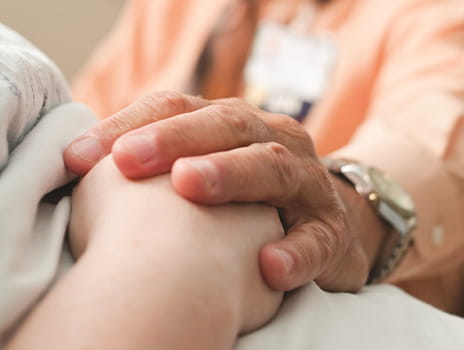August 15, 2022
Sometimes people think “NODA” is chaplain Becky Johnson’s last name. It’s right there on her work badge. In all caps. It might as well be her middle name.
NODA stands for No One Dies Alone, and it’s a touching and fascinating program that got its start 10 years ago at The University of Kansas Health System.
The name says it all.
The health system actively works to make sure no one dies alone during our care.
Caring for people at every step
“My perspective comes from being a nurse,” said Rebecca Moburg. “I have attended to a patient who has died without family or friends with them. I consider death to be an extraordinarily sacred moment in time and space, and it is an honor to be there.”
Moburg, who often goes by Becky, oversees our patient relations team. That, among many things, includes 7 full-time chaplains, 1 part-time chaplain and a whole lot of hours dedicated to patient care. Johnson (“Becky Jo” to differentiate them) is one of those full-timers and the lead on NODA. When people see NODA on her badge, they ask her about it.
“Oh, I’ve always wanted to do that,” she recalls a few of them saying.
That really happens. It might not be everybody’s cup of tea. But there are 103 employees from the health system and the University of Kansas Medical Center who have signed up to sit with a patient who’s about die alone.
I reasoned he was a DNR (do not resuscitate), no family, very old, end-stage multi-organ disease; now he was gone, and I felt awful. It was OK for him to die; it was his time. But not alone. – Sarah Clarke, CCRN
Founder, No One Dies Alone
Rooted in experience
A critical care nurse from Eugene, Oregon, is credited with kick-starting a nationwide NODA effort 10 years before it started here. Sarah Clarke had checked in on a dying patient who asked, “Can you stay with me?” She said yes, but first she had to round on her other patients. When she returned a half-hour later, the man had died.
“I reasoned he was a DNR (do not resuscitate), no family, very old, end-stage multi-organ disease; now he was gone, and I felt awful,” Clarke wrote. “It was OK for him to die – it was his time – but not alone.”
Her story resonated with healthcare providers across the country.
Alone no more
With the number of NODA volunteers increasing over the years, Johnson said she hopes the program can expand to include giving relief to families or friends who need to step away for a quick meal or to go pick up others trying to make it to the hospital. Right now, the focus is on those dying alone. Johnson pointed out that her team often doesn’t know why a person is alone.
They could be the last surviving member of the family, estranged from their family, found their way to a hospital from a different city or just simply isolated.
“We don’t know why people don’t have anyone,” she said.
Except now, they do. More than a hundred of us and growing.
If you are interested in volunteering at The University of Kansas Health System, contact us.
Interested in hearing Toby's latest take? Subscribe to follow along.





